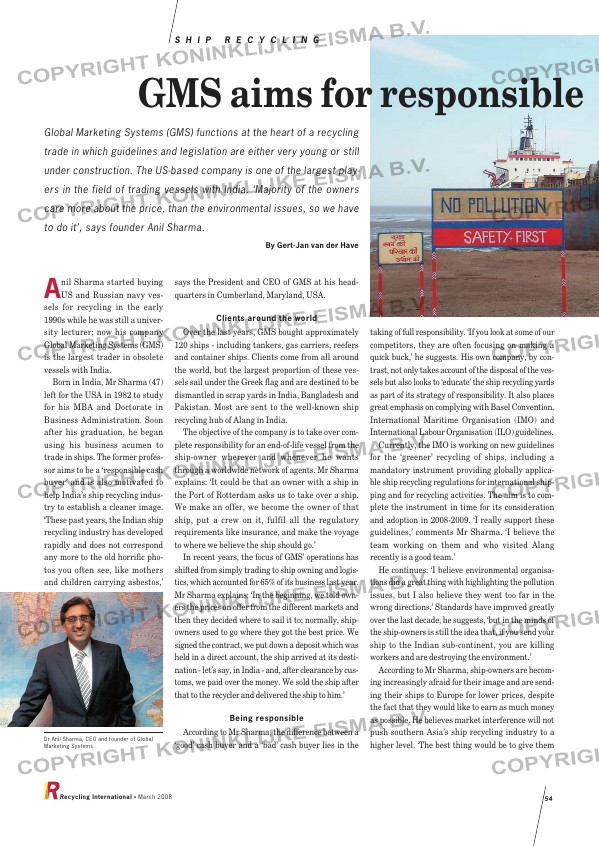Page 54 from: March 2008

says the President and CEO of GMS at his head-
quarters in Cumberland, Maryland, USA.
Clients around the world
Over the last years, GMS bought approximately
120 ships – including tankers, gas carriers, reefers
and container ships. Clients come from all around
the world, but the largest proportion of these ves-
sels sail under the Greek flag and are destined to be
dismantled in scrap yards in India, Bangladesh and
Pakistan. Most are sent to the well-known ship
recycling hub of Alang in India.
The objective of the company is to take over com-
plete responsibility for an end-of-life vessel from the
ship-owner wherever and whenever he wants
through a worldwide network of agents. Mr Sharma
explains: ‘It could be that an owner with a ship in
the Port of Rotterdam asks us to take over a ship.
We make an offer, we become the owner of that
ship, put a crew on it, fulfil all the regulatory
requirements like insurance, and make the voyage
to where we believe the ship should go.’
In recent years, the focus of GMS’ operations has
shifted from simply trading to ship owning and logis-
tics, which accounted for 65% of its business last year.
Mr Sharma explains: ‘In the beginning, we told own-
ers the prices on offer from the different markets and
then they decided where to sail it to; normally, ship-
owners used to go where they got the best price. We
signed the contract, we put down a deposit which was
held in a direct account, the ship arrived at its desti-
nation – let’s say, in India – and, after clearance by cus-
toms, we paid over the money. We sold the ship after
that to the recycler and delivered the ship to him.’
Being responsible
According to Mr Sharma, the difference between a
‘good’ cash buyer and a ‘bad’ cash buyer lies in the
taking of full responsibility. ‘If you look at some of our
competitors, they are often focusing on making a
quick buck,’ he suggests. His own company, by con-
trast, not only takes account of the disposal of the ves-
sels but also looks to ‘educate’ the ship recycling yards
as part of its strategy of responsibility. It also places
great emphasis on complying with Basel Convention,
International Maritime Organisation (IMO) and
International Labour Organisation (ILO) guidelines.
Currently, the IMO is working on new guidelines
for the ‘greener’ recycling of ships, including a
mandatory instrument providing globally applica-
ble ship recycling regulations for international ship-
ping and for recycling activities. The aim is to com-
plete the instrument in time for its consideration
and adoption in 2008-2009. ‘I really support these
guidelines,’ comments Mr Sharma. ‘I believe the
team working on them and who visited Alang
recently is a good team.’
He continues: ‘I believe environmental organisa-
tions did a great thing with highlighting the pollution
issues, but I also believe they went too far in the
wrong directions.’ Standards have improved greatly
over the last decade, he suggests, ‘but in the minds of
the ship-owners is still the idea that, if you send your
ship to the Indian sub-continent, you are killing
workers and are destroying the environment.’
According to Mr Sharma, ship-owners are becom-
ing increasingly afraid for their image and are send-
ing their ships to Europe for lower prices, despite
the fact that they would like to earn as much money
as possible. He believes market interference will not
push southern Asia’s ship recycling industry to a
higher level. ‘The best thing would be to give them
S H I P R E C Y C L I N G
Recycling International • March 2008 54
Global Marketing Systems (GMS) functions at the heart of a recycling
trade in which guidelines and legislation are either very young or still
under construction. The US-based company is one of the largest play-
ers in the field of trading vessels with India. ‘Majority of the owners
care more about the price, than the environmental issues, so we have
to do it’, says founder Anil Sharma.
By Gert-Jan van der Have
GMS aims for responsible v
Dr Anil Sharma, CEO and founder of Global
Marketing Systems.
Anil Sharma started buyingUS and Russian navy ves-
sels for recycling in the early
1990s while he was still a univer-
sity lecturer; now his company
Global Marketing Systems (GMS)
is the largest trader in obsolete
vessels with India.
Born in India, Mr Sharma (47)
left for the USA in 1982 to study
for his MBA and Doctorate in
Business Administration. Soon
after his graduation, he began
using his business acumen to
trade in ships. The former profes-
sor aims to be a ‘responsible cash
buyer’ and is also motivated to
help India’s ship recycling indus-
try to establish a cleaner image.
‘These past years, the Indian ship
recycling industry has developed
rapidly and does not correspond
any more to the old horrific pho-
tos you often see, like mothers
and children carrying asbestos,’
RI_053 Shipbreaking:Opmaak 1 28-02-2008 11:56 Pagina 54



